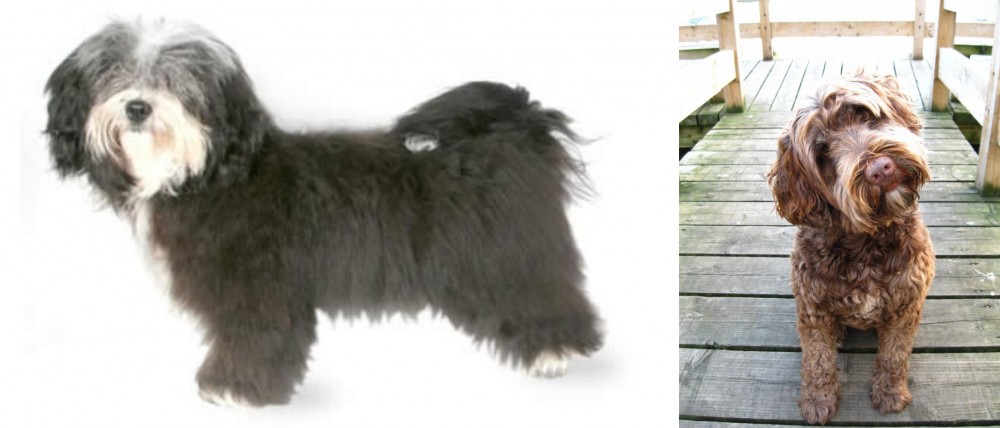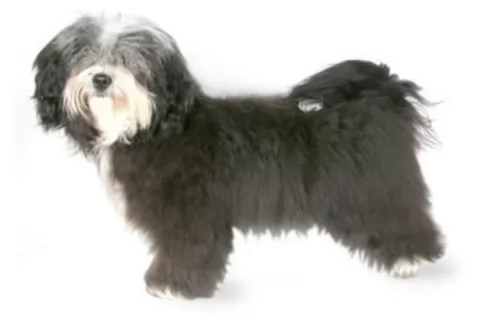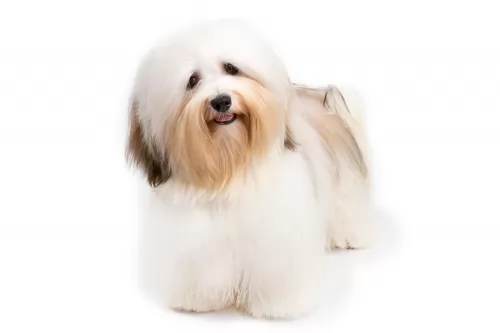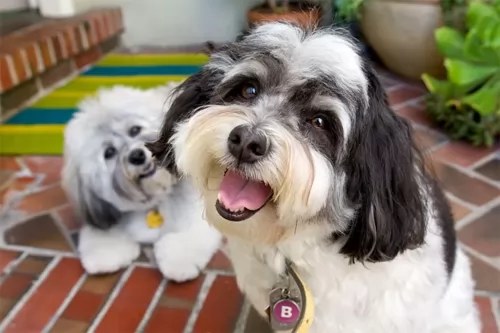 Petzlover
Petzlover Havanese is originated from Cuba but Portuguese Water Dog is originated from Portugal. Havanese may grow 30 cm / 11 inches shorter than Portuguese Water Dog. Havanese may weigh 21 kg / 46 pounds lesser than Portuguese Water Dog. Both Havanese and Portuguese Water Dog has almost same life span. Both Havanese and Portuguese Water Dog has almost same litter size. Havanese requires High Maintenance. But Portuguese Water Dog requires Low Maintenance
Havanese is originated from Cuba but Portuguese Water Dog is originated from Portugal. Havanese may grow 30 cm / 11 inches shorter than Portuguese Water Dog. Havanese may weigh 21 kg / 46 pounds lesser than Portuguese Water Dog. Both Havanese and Portuguese Water Dog has almost same life span. Both Havanese and Portuguese Water Dog has almost same litter size. Havanese requires High Maintenance. But Portuguese Water Dog requires Low Maintenance
 The only breed of dog that is native to Cuba is the Havanese. These little dogs are great companion animals. Sociable and happy, they are very popular in the United States with urbanites. These happy little pups are a Bichon type of dog which was developed from the “Little White Dog of Havana” or the Blanquito de la Habana which is now extinct.
The only breed of dog that is native to Cuba is the Havanese. These little dogs are great companion animals. Sociable and happy, they are very popular in the United States with urbanites. These happy little pups are a Bichon type of dog which was developed from the “Little White Dog of Havana” or the Blanquito de la Habana which is now extinct.
The Blanquito de la Habana was itself developed from another extinct breed the Bichon Tenerife. Then the Blanquito was bred with the other Bichons and poodles in developing the Havanese. It is believed that some of the first people to settle in Cuba were from Tenerife, an island close to Cuba. In the early part of the sixteenth century, little white dogs were brought to Cuba with these settlers. This dog of Tenerife is believed to be the ancestor of all Bichon breeds.
At that time trade with Cuba was highly restricted by the Spanish and so these dogs developed without any crossing from other breeds from outside the country. They grew to be able to stand hot temperatures and they grew a very unique coat – almost like silk. Their coat is soft and light, while insulating them from the tropical environment.
At this time Cuba was the place to be for Europeans aristocrats on vacation. Unlike the British colonies, Cuba had theatres, operas and palacious. When going back to Europe, many took this little white dog with them to France, Spain and England. The Dog of Havannah was a favorite on European soil as well. Many of these dogs taken to Europe were fawn or parti instead of white. Meanwhile back in Cuba, the bourgeoisie were replacing the aristocracy who themselves would soon be replaced by the Revolution.
During the days of the bourgeoisie, the Havanese became very popular household pets. The breed has been a family pet for the last 150 years. At the same time the breed was very trendy in Europe with Charles Dickens and Queen Victoria owning several. They were by now familiar participants in Europe’s dog shows. Finally, with the Revolution, the bourgeoisie left the country in droves with their little white dogs. A genetic pool was then formed in the US. Gene pool from 11 dogs. All the Havanese in the world are descended from those 11 dogs with the exception of the dogs isolated in Cuba and the US. Today the Havanese is one of the most popular and fastest growing breeds in the world.
 The Portuguese Water Dog is a working dog hailing from the Portuguese region of the Algarve. The dog has always been a friend of the sea, working around fishing boats, loving his life around water.
The Portuguese Water Dog is a working dog hailing from the Portuguese region of the Algarve. The dog has always been a friend of the sea, working around fishing boats, loving his life around water.
He descends from dogs that have always been used by Portuguese fishermen, and its believed he has Poodle in him. Known also as the Cao de Agua, which means Dog of the Water, the Portie as he is also known, almost disappeared.
Their numbers dropped in the early 20th century, but a certain Vasco Bensuade saved the breed, forming a breed club, writing a breed standard.
They then also made their way to England and the United States. It was in 1972 that the Portuguese Water Dog Club of America formed. In 1983, the AKC recognized the dog as a distinct breed.
 The Havanese is a sturdy little dog, a member of the toy group. They weigh no more than 16 pounds (7.3kg) and his body is longer than it is tall. The breed has a unique topline that is not level, but it is straight. His front legs are longer than his hind legs producing the lively gait everyone is used to seeing with a Havanese. With a full muzzle that tapers to the nose, the Havanese does not seem to be short. The skull’s length is the same as the muzzle’s. The head of the Havanese is round in the back and flat in the front.
The Havanese is a sturdy little dog, a member of the toy group. They weigh no more than 16 pounds (7.3kg) and his body is longer than it is tall. The breed has a unique topline that is not level, but it is straight. His front legs are longer than his hind legs producing the lively gait everyone is used to seeing with a Havanese. With a full muzzle that tapers to the nose, the Havanese does not seem to be short. The skull’s length is the same as the muzzle’s. The head of the Havanese is round in the back and flat in the front.
They have a deep chest, almond shaped eyes that are dark brown and their ears are about halfway down the nose. The long ears hang down the side od the face. They have a long plumed tail that is held high and upward. The standard for the breed and now the laws of the United Kingdom state that there can be no docking of the tail.
 Standing at between 43 and 57cm in height and weighing in the region of 16 to 27kg, the Portuguese Water Dog is a medium-sized, curly-coated dog.
Standing at between 43 and 57cm in height and weighing in the region of 16 to 27kg, the Portuguese Water Dog is a medium-sized, curly-coated dog.
It is believed that the dog is hypoallergenic. He does however shed, though not a lot. He just loves the water and is always ready to plunge in. One of the distinctive characteristics of this dog is its webbed feet.
The Portuguese Water Dog is an intelligent dog that will do well with training and socialization.
It won’t be troublesome training this dog as he is intelligent. They're also calm dogs. Referred to fondly as the Portie, this is a fun-loving dog, friendly and social, getting on well with all members of his human family.
These dogs get on well with children and other family pets. They can be reserved toward strangers, but this makes them good watchdogs.
 Havanese are highly intelligent and eager to please, and they are easily trained so long as you use only positive methods. This can be a sensitive breed, so care must be taken to not scold them harshly. Socialization from an early age is very important. Expose them calmly to a wide variety of new places and new people, always ensuring that the experiences are positive and not intimidating. Gentle, patient training will result in a wonderful companion dog. They are affectionate with people and get along with other nonaggressive pets.
Havanese are highly intelligent and eager to please, and they are easily trained so long as you use only positive methods. This can be a sensitive breed, so care must be taken to not scold them harshly. Socialization from an early age is very important. Expose them calmly to a wide variety of new places and new people, always ensuring that the experiences are positive and not intimidating. Gentle, patient training will result in a wonderful companion dog. They are affectionate with people and get along with other nonaggressive pets.
The Havanese is the consummate lap dog. Over time they have become the lovable family companion.
The breed is pretty adaptable being able to live as a companion animal in almost any setting. Just don’t expect your Havanese to go hiking or romp with you on 40 acres in the country.
They are intelligent, love to learn but can be a little stubborn. Train them early as they like their habits and its much harder to train an older Havanese.
 With training, your Portie can make a splendid pet. He is also adaptable to different living situations, and is capable of living in the city or in the countryside, just so long as his exercise needs are met.
With training, your Portie can make a splendid pet. He is also adaptable to different living situations, and is capable of living in the city or in the countryside, just so long as his exercise needs are met.
He is such an affectionate and loyal, fun-loving dog while also being hard working, and all these wonderful characteristics mean that he can be a treasured pet and companion.
 A very healthy breed, the Havanese doesn’t have a lot of health issues, but they are not immune to the problems of small breed dogs. The issues they do have are:
A very healthy breed, the Havanese doesn’t have a lot of health issues, but they are not immune to the problems of small breed dogs. The issues they do have are:
 Portuguese Water Dogs are generally healthy, but like most other dogs they are more prone to certain heath conditions, though your pet is unlikely to get any of them. Still it pays to know of some of the more complicated- and disabling ones.
Portuguese Water Dogs are generally healthy, but like most other dogs they are more prone to certain heath conditions, though your pet is unlikely to get any of them. Still it pays to know of some of the more complicated- and disabling ones.
This is where the thighbone doesn't fit properly into the hip joint. Hip dysplasia spells pain for your dog and he may show lameness with one or both rear legs. Arthritis can develop too.
Hip dysplasia is hereditary, but it can be worsened by allowing your dog to become obese and from injuries from leaping off your bed for instance.
This is a degenerative eye disorder that can lead to blindness, but fortunately it is detectable long before the dog shows signs of blindness.
Reputable breeders have the eyes of their dog certified each year by a veterinary ophthalmologist and they don’t allow the dogs to produce puppies.
 Feed 3 to 4 times per day a high quality dry puppy food for toy or small dogs. Feed ¼ to ½ cup each time.
Feed 3 to 4 times per day a high quality dry puppy food for toy or small dogs. Feed ¼ to ½ cup each time.
Remember these are small dogs and don’t overfeed. Feed a high quality dry food for small or toy dogs. Feed twice a day at about ½ cup each time.
The breed is generally very healthy.
This breed is not an overly active dog, but he does need some exercise. A nice walk once a day or a backyard to play in. They play inside as well as out. Don’t over exercise the Havanese. They do well in obedience and confirmation more so than agility or fly ball
 Your Portie is a dog that loves outdoor life and lots of exercise. Take him with you on your walks and give him a run off his leash. When he gets home, if you have a pool h’ll be the first to plunge right in. He makes a great pet to have at the sea too.
Your Portie is a dog that loves outdoor life and lots of exercise. Take him with you on your walks and give him a run off his leash. When he gets home, if you have a pool h’ll be the first to plunge right in. He makes a great pet to have at the sea too.
Provide him with plenty of nice chewy toys, balls and ropes so he doesn’t get bored.
Provide him with a nice, dry, warm sleeping area and don’t allow him to be disturbed when he retreats there.
Keep his vaccines up to date to prevent some life threatening illnesses.
Provide him with high quality food that has lots of vitamins and minerals instead of fillers, preservatives, colorants and toxins.
There are some excellent commercially manufactured dog foods which can be convenient and good for your pet. Try and provide him with some tasty homemade food occasionally. Nothing spicy and exotic. Dogs thrive on simplicity and consistency.
Boiled chicken, brown rice or pasta, carrots, spinach and sweet potatoes chopped up and added twice week to the dry kibble is all your dog requires to keep him energetic happy, thankful, healthy and happy.
A little bit of raw meat added in from time to time will be superb. See that he always has access to clean, cool water.